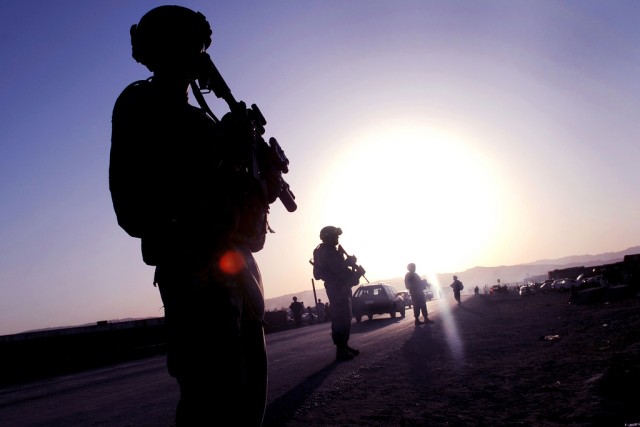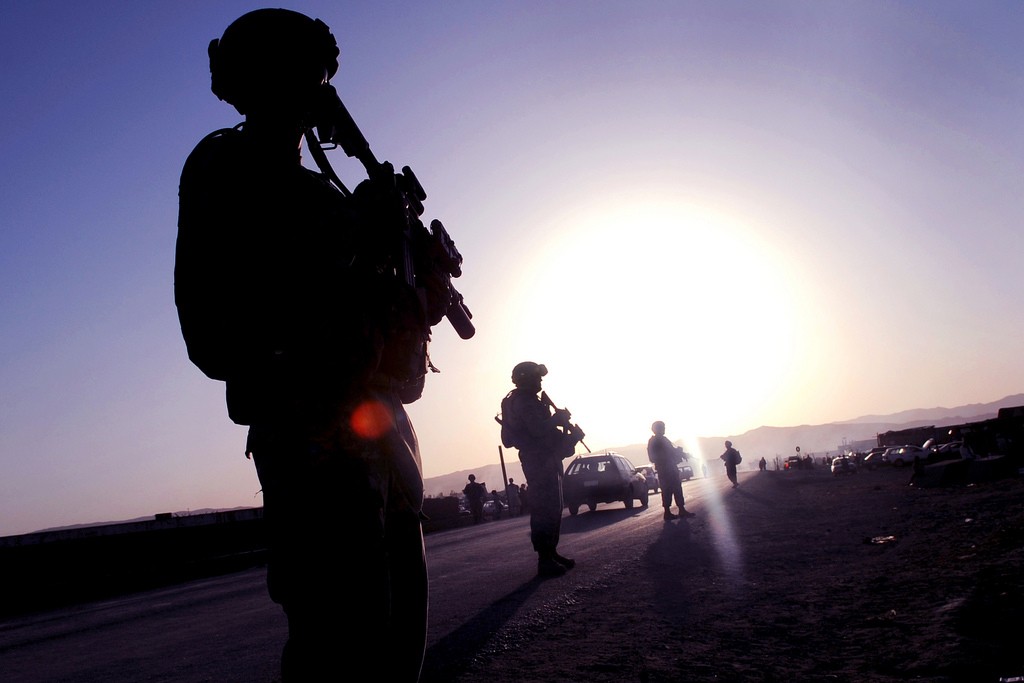As of 2008, nearly 200,000 private contractors supported or supplemented military operations in Iraq, with about 30,000 of them providing security services. Today, civilian contractors working for the Pentagon outnumber uniformed forces in Afghanistan. Doug Brooks, president of the International Peace Operations Association, the private security industry's trade organization, suggests that the booming private security industry is here to stay.
Nations have employed civilian contractors to fulfill combat and combat support functions throughout history. But alarming to many observers is the rapid rise of a largely un- (or under-) controlled industry: from less than 15 percent of contractors among the Department of Defense's workforce during World War II to more than 60 percent currently in Afghanistan.
Security contractors often work side-by-side with soldiers and sometimes take on roles traditionally performed by the military. Is the use of contractors compatible with the strong and pervasive professional military ethos' What are the motivations, values, and attitudes of individuals who sign on with private security firms' Do they share norms, behavioral codes, and a professional identity' How do contractors view their professional status and relationship with traditional military forces' How do military members view contractors'
Using survey methodology, we explore some of these questions. Specifically, we compare the attitudes of US military officers to those of security contractors with law-enforcement backgrounds who had completed at least one overseas deployment with a security firm and examine how the two groups view each other, their roles, and professional status.
We frame our analysis with a discussion of military professionalism in the United States and the extent to which employees of the private security industry possess similar traits. Next, we present and compare the results of our research using samples of officers and contractors. Finally, we conclude with a discussion of implications for the relationship between military professionals and security contractors in peace and stability operations.
The Military Profession and Civilian Contractors
What is a military professional' Are all members of the military professionals'
Are civilians who perform military duties professionals' Do they regard themselves as professionals' Are they regarded as such by officers' This section delineates the traits of the military profession and assesses the degree to which civilian contractors possess these traits.
Five decades ago, Samuel Huntington and Morris Janowitz argued that military officers are professionals in the art of war and the management of violence. Officers' area of expertise is in the planning, organizing, and employment of military force. Huntington divided these tasks into two subfields: combat and command, and proficiency in "technical support (administration, comptroller, supply) and professional support (legal, religious, medical)." For Huntington, officers who mastered the technical or professional support area of military activity were not members of the military profession because their expertise was split between the management of violence and technical or job-related knowledge, the latter of which was not unique to the military.
Traditionally, it is in the technical and support categories where the employment of civilian contractors has been most prevalent. But contract employees have also penetrated into the realm of combat and command. In 2008, an estimated 30,000 contractors provided security services in Iraq.7 Of these, approximately three-quarters were armed, presenting the second largest armed force in Iraq, behind only the US military.8 At present, between 10,000 and 13,000 private security operatives are working on contracts for the Department of Defense or Department of State, constituting approximately five percent of all US-funded contractor personnel.
The military's broad array of expert knowledge is organized to maximize its usefulness in tackling problems within the security arena, which is in flux at the margins as the profession expands its ambit and fends off or accedes to jurisdictional challenges from other groups, including the private sector. Nevertheless, professional military expertise still is predominant in resolving security challenges through the threat and application of organized, state-sanctioned violence at the tactical, operational, and strategic levels. Typically, in stable democratic societies, the military provides protection against external threats. Internal security is provided largely by paramilitary law enforcement groups. In post-conflict or transitional nations, however, militaries are often called upon to provide security, combat terrorism and insurgencies, and support the international community's peace and stabilization efforts.
Civilian companies also perform a wide variety of functions related to the threat or application of organized, state-sponsored force to resolve political challenges; and they are organized to effectively do so. By adopting a corporate business model, these firms are able to recruit and retain former military personnel, develop organizational frameworks within which procedures, doctrine, and innovation can be produced, and, as a result, offer an array of capabilities that cover the gamut of military services beyond
mere tactical support. P. W. Singer distinguishes among three types of security businesses: military provider firms, military consultant firms, and military support firms that provide combat, training and advising, and technical support respectively.13 A recent study by Volker Franke and Marc von Boemcken fine-tunes this distinction, offering a five-category typology of armed operational combat support, armed security services, unarmed operational combat support, military- or security-related advice and training, and military support services.
Membership in the military profession traditionally has been limited to the uniformed personnel employed by the state. Although there is some debate regarding whether all military personnel are military professionals- be they officers, noncommissioned officers, career enlisted members, conscripts, reservists of any rank, or national guardsmen-there is a consensus that persons who utilize or manage violence as employees of private entities are not members of the military profession.
When contracted to work for government agencies, the employees of private security firms lay claim to be agents of the state, albeit indirect ones. According to a recent report by the Congressional Research Service, "Conduct that violates international obligations is attributable to a State if it is committed by the government of the State or any of its political subdivisions, or by any official, employee, or agent operating within the scope of authority of any of these governments, or under color of such authority." Former Blackwater President Erik Prince suggests such color existed for his firm: "From the beginning, these individuals [Blackwater employees] have been bound by detailed contracts that ensure intensive government direction and control. The US government sets comprehensive standards for the selection and training of security guards. Blackwater's competitively awarded contract contains dozens of pages detailing requirements for each position and specifying hour-by-hour training for each individual."
Additionally, the revenue of these firms comes primarily from government sources. The Congressional Budget Office estimates that direct US government spending on private security services in international locales was $6 billion to $10 billion over the 2003-2007 period with $3 billion to $4 billion spent in Iraq. Such expenditures rival the defense budgets of many nations.
Another key aspect of the military profession is its vocational nature; its members are not primarily motivated by material rewards. Huntington argued that: The officer is not a mercenary who transfers his services wherever they are best rewarded . . . . Clearly he does not act primarily from economic incentives. In western society the vocation of officership is not well rewarded monetarily. Nor is his behavior within his profession governed by economic rewards and punishments . . . . The motivations of the officer are a technical love for his craft and the sense of social obligation to utilize this craft for the benefit of society.
Charles Moskos suggested that vocations motivated by economic rewards are occupations rather than professions.20 Military professionals receive compensation that is a function of pay grade, much of which is deferred or in the form of subsidies rather than cash for service. Clearly, by this standard, mercenaries "who fight for employers other than their home state's government [and whose] motivation for fighting is economic gain" fall outside of the military profession. Many have argued that the prospect of extraordinary monetary gain serves as a central motivator for individuals to sign on with private security firms and engage in what we term in this context the "securitized management of violence." Indeed, private security firms pay considerably higher wages than the military at the comparable skill level and grade...
To continue reading the entire article, please click <a href="http://www.carlisle.army.mil/usawc/parameters/09winter/schaub%20and%20franke.pdf" target="_blank"><u>here</u></a> to download the PDF.


Social Sharing